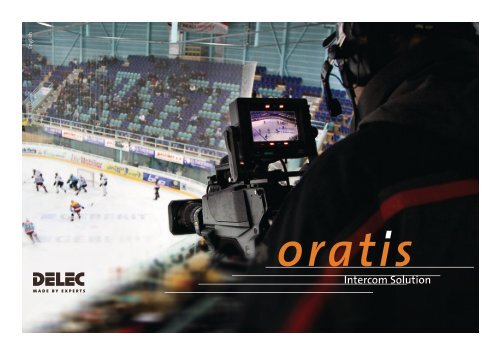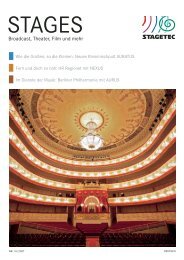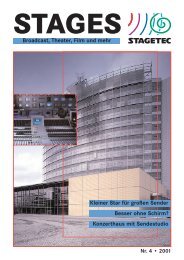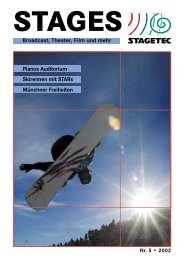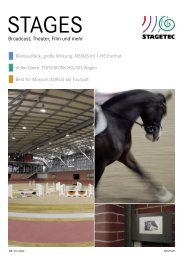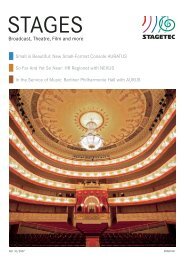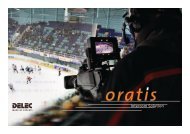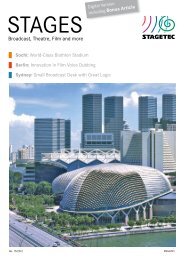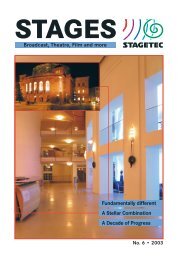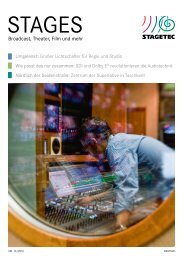DELEC oratis Intercom Solution
DELEC oratis Intercom Solution
DELEC oratis Intercom Solution
You also want an ePaper? Increase the reach of your titles
YUMPU automatically turns print PDFs into web optimized ePapers that Google loves.
English<br />
made by experts<br />
<strong>Intercom</strong> <strong>Solution</strong>
02<br />
First For:<br />
Reliable <strong>Intercom</strong><br />
From Simple to Sophisticated<br />
The <strong>oratis</strong> is a first-class intercom system. It is based on<br />
current FPGA technology and offers unique flexibility and<br />
future-proofing combined with <strong>DELEC</strong>’s renowned high<br />
reliability.<br />
<strong>oratis</strong> can be used to create compact intercom systems<br />
featuring as few as eight ports to larger installations with<br />
more than 4,000 ports accessible simultaneously. The system<br />
employs the principle of distributed intelligence. This<br />
guarantees fast response times even on large systems, while<br />
ensuring confidence and security. <strong>oratis</strong> acts as a fully<br />
summing digital audio matrix.<br />
The benefits:<br />
Leading technology, safe investment<br />
Space-saving I/O with the highest density<br />
Open, scalable configuration<br />
Perfect audio quality 48kHz / 24bit<br />
Innovative subscriber panel design<br />
Convenient set-up<br />
Excellent reliability with flexible redundancy<br />
No single point of failure<br />
Networked via Ethernet<br />
Adaptable and Scalable<br />
<strong>oratis</strong> intercom systems include three basic components: one<br />
or more matrix frames, various matrix cards, and the subscriber<br />
panels connected to them.<br />
The quantity and configuration of components are freely<br />
definable, enabling the <strong>oratis</strong> to adapt to a multitude of<br />
applications.<br />
To increase the number of matrix points, just add more matrix<br />
cards. <strong>oratis</strong> scales up from small systems to campus or even<br />
region wide installations.<br />
Each matrix card acts as a self-contained, independent audio<br />
router. Thanks to the unique concept of distributed<br />
intelligence, the <strong>oratis</strong> avoids any single point of failure –<br />
maximum reliability and security are built into the foundations<br />
of the system!<br />
Matrix Frame Matrix Card Subscriber Panel<br />
03
04<br />
Keeping Your Connections in View:<br />
User Friendly Subscriber panels<br />
<strong>oratis</strong> subscriber panels feature special displays which<br />
indicate the call destinations. Up to 18 characters of<br />
full text in every major language are used to describe<br />
the targets. The displays guarantee optimum legibility<br />
in all lighting conditions and from any viewing angle.<br />
<strong>oratis</strong> users can choose between desktop units and 19"<br />
rack subscriber panels with an expandable number<br />
of keys. The standard subscriber panel includes an<br />
internal audio matrix for routing signals to connected<br />
headphones, speakers and other destinations.<br />
Naturally, all <strong>oratis</strong> subscriber panels offer<br />
multicoloured indications to show the call status of<br />
each key. Special Danner modules for building into<br />
desks are also available.<br />
All subscriber panels offer:<br />
Configurable key layers<br />
Eight function keys per subscriber panel<br />
Auto-reply function<br />
Individual display and volume adjustment for each crosspoint<br />
Integrated dynamics unit with compressor, limiter,<br />
and noise gate inserted in the microphone path<br />
Up to two stereo headsets connections<br />
Up to two microphone ports with phantom power<br />
External speaker port<br />
GPI (two inputs, two outputs)<br />
Stereo AUX input and output, AES3 AUX input and output<br />
Type Size Subscriber<br />
Buttons<br />
Headset<br />
Interface<br />
Auxiliary<br />
Analogue<br />
Talk 16 19"/1RU 16 2 2 Ch In<br />
2 Ch Out<br />
Auxiliary<br />
AES3<br />
2 Ch In<br />
2 Ch Out<br />
Matrix<br />
Interface<br />
AES3,<br />
Analogue<br />
+ RS232,<br />
VoIP<br />
GPI<br />
3 In / 4 Out<br />
Talk 16L 19"/1RU 16 1 - - AES3 3 In / 4 Out<br />
Key 16 19"/1RU 16 - - - - -<br />
Desk 16 Desktop<br />
Subscriber<br />
Panel<br />
Desk 16L Desktop<br />
Subscriber<br />
Panel<br />
16 2 2 Ch In<br />
2 Ch Out<br />
2 Ch In<br />
2 Ch Out<br />
AES3,<br />
Analogue<br />
+ RS232,<br />
VoIP<br />
3 In / 4 Out<br />
16 1 - - AES3 3 In / 4 Out<br />
Talk 11X 19"/1RU 11 1 2 Ch In<br />
1 Ch Out<br />
Talk 28X 19"/2RU 28 1 2 Ch In<br />
1 Ch Out<br />
Table 8X Desk Subscriber<br />
Unit<br />
Table 16X Desk Subscriber<br />
Unit<br />
8 1 Either<br />
2 AUX In / 1 AUX Out or<br />
2 GPI In / 2 GPI Out<br />
16 1 Either<br />
2 AUX In / 1 AUX Out or<br />
2 GPI In / 2 GPI Out<br />
- Analogue<br />
+ RS232<br />
- Analogue<br />
+ RS232<br />
- Analogue<br />
+ RS232<br />
- Analogue<br />
+ RS232<br />
Danner 4X 190mm x 40mm 4 - - - RS232 -<br />
Danner 12X 190mm x 80mm 12 - - - RS232 -<br />
Danner 6 190mm x 40mm 6 - - - RS232 -<br />
Danner 18 190mm x 80mm 18 - - - RS232 -<br />
Danner AM 190mm x 40mm - 1 2 Ch In<br />
1 Ch Out<br />
- Analogue<br />
+ RS232<br />
2 In / 2 Out<br />
2 In / 2 Out<br />
Either<br />
2 GPI In / 2 GPI Out or<br />
2 AUX In / 1 AUX Out<br />
Either<br />
2 GPI In / 2 GPI Out or<br />
2 AUX In / 1 AUX Out<br />
2 In / 2 Out<br />
05
06<br />
The Big Selection:<br />
Matrix Cards for Every Application<br />
An extensive range of matrix cards is available for configuring<br />
an <strong>oratis</strong> intercom system. While providing largely identical<br />
functionality, they differ mainly in their port configuration.<br />
Whether CAT-5, coax, or optical cable, balanced analogue,<br />
digital, or designed for Voice over IP – your application rules<br />
your selection.<br />
Signal routing on all <strong>oratis</strong> matrix cards is processed by a<br />
modern FPGA processor. In contrast to hardwired signal paths,<br />
all processing stages and signal routes are implemented in<br />
software. Thus, <strong>oratis</strong> systems offer unprecedented flexibility<br />
and future-proofing.<br />
All input and output signals can either be transparently<br />
routed on the matrix cards or routed via optional DSP modules.<br />
Functions available include gain control, filters, dynamics and<br />
delays.<br />
Name Number of Ports Interface Format Other<br />
IF 8DIG 8 CAT-5 Cable / RJ45 AES3 Subscriber Panel and 4-wire Board,<br />
two bidirectional Audio Channels per Port<br />
IF 8A 8 CAT-5 Cable / RJ45 Analogue<br />
Audio Connection<br />
All matrix cards feature:<br />
Audio routing using a flexible and extensible<br />
FPGA configuration<br />
Audio in broadcast quality: 48kHz sample rate,<br />
24bit word length (with internal 32bit processing)<br />
Transparent routing of digital signals<br />
Optional DSPs for I/O-signal processing<br />
Subscriber Panel and 4-wire Board,<br />
one bidirectional Audio Channel per Port<br />
IF 8COAX 8 Coax 75Ω Cable / BNC AES3 Subscriber Panel Board,<br />
two bidirectional Audio Channels per Port<br />
IF 8IP 8 CAT-5 Cable / RJ45 Voice over IP Connection Subscriber Panel Board,<br />
one bidirectional Audio Channel per Port<br />
IF MADI1 64 LC SFP-Module* MADI Interface 64 bidirectional Audio Channels,<br />
freely scalable,<br />
optional rendundant connection<br />
IF MADI2 2 x 64 LC SFP-Module* MADI Interface 2x 64 bidirectionsl Audio Channels,<br />
freely scalable,<br />
optional rendundant connections<br />
IF Link LC SFP-Module* Redundant Fibre Optic Board<br />
GPIO 32 Screw Terminal,<br />
Connection to Matrix via<br />
CAT-5 Cable / RJ45<br />
* Fibre Optic Connector can be customized<br />
16 GPI In / 16 GPI Out,<br />
alternatively 8 GPI In / 24 GPI Out,<br />
half 19" width, 1RU<br />
FPGA: Flexible Signal Pathways<br />
In all new <strong>oratis</strong> boards, Field Programmable Gate Arrays,<br />
(FPGAs), replace conventional signal paths. Instead of<br />
designing the signal pathway with copper connections in<br />
several layers on a circuit board, the logic modules of the<br />
FPGAs calculate the required signal path. The big<br />
advantage: Changes can be implemented quickly and at<br />
low cost by simply re-programming the software.<br />
Expensive and time-consuming design of complex new<br />
circuit boards can be avoided. Thanks to this technology<br />
you can be sure that the <strong>oratis</strong> system can always match<br />
future requirements!<br />
Internally an FPGA chip is based on parallel processing<br />
and can compute many channels simultaneously. This also<br />
offers the advantage of further increasing the packing<br />
density. The high speed processing with constant and<br />
short computation time is also very beneficial. For these<br />
reasons, FPGAs are already established as the standard in<br />
other hi-tech markets such as telecommunications and<br />
the Internet.<br />
07
08<br />
Networking Without Frontiers:<br />
The Audio Matrix<br />
<strong>oratis</strong> matrix frames are available in various sizes, notable for<br />
their high input/output density with more than 30 subscriber<br />
panel ports per rack unit; making <strong>oratis</strong> a system of choice in<br />
the OB truck. Matrix frames can be extended by adding external<br />
GPIO-devices for different controlling tasks.<br />
Combining multiple matrix frames results in systems featuring<br />
up to 4,096 ports, which can all be active simultaneously.<br />
Networking of the matrix frames, including clock distribution, is<br />
done with fibre-optic cabling using the Gigabit Ethernet layer-2<br />
protocol. This protocol permits direct connections between<br />
matrix frames, while allowing the connection of remote frames<br />
using managed Gigabit Ethernet switches.<br />
All matrix frames feature:<br />
Fully summing audio matrix<br />
The <strong>oratis</strong> is a fully summing matrix. Each matrix frame is<br />
capable of routing up to 256 summed channels to each output.<br />
This makes for virtually unlimited eavesdrop sums or large<br />
conferences.<br />
Extensible by networking multiple matrix frames<br />
32bit TDM bus for up to 256 signals<br />
Fully redundant clock distribution<br />
Hot-swappable matrix cards, matrix frames, and power-supplies<br />
Studio-standard audio quality – 24bit, 48kHz<br />
External Wordclock input<br />
Name Rack Units max. Number of Slots max. Number of Ports Other<br />
MF2 2 7 56 Ports for Subscriber panels Matrix Frame,<br />
max. 256 Ports<br />
MF4 4 15 120 Ports for Subscriber panels Matrix Frame,<br />
max. 256 Ports<br />
R4000 1 8 Segments 1,024 Time Slots Router,<br />
max. 4,096 Ports<br />
(Cascade of four R4000)<br />
max. 128 Ports per Segment<br />
09
10<br />
Optimum Control With IcconXP<br />
The convenient IcconXP control program sets up the<br />
numerous functions of an <strong>oratis</strong> intercom system quickly<br />
and easily. IcconXP runs on a standard PC and can be used<br />
either online over a LAN connection to the <strong>oratis</strong> or offline<br />
for advanced programming and configuration.<br />
IcconXP offers simple drag ’n’ drop functionality for most<br />
configuration tasks. From subscriber panel assignments to<br />
group definitions to complex logic programming, all<br />
settings are displayed in clear graphical dialogues. Changes<br />
can be uploaded to a live <strong>oratis</strong> system without any<br />
interruption to operation. Once set up, the <strong>oratis</strong> runs<br />
independently – no control computer is needed for on-going<br />
operation.<br />
In keeping with the overall <strong>oratis</strong> concept, IcconXP has a<br />
modular structure. Extra modules, such as a convenient<br />
conference matrix for master control room applications or<br />
remote-control features for subscriber panels, are added as<br />
required.<br />
A dedicated interface is available for connecting the <strong>oratis</strong><br />
to third-party proprietary control systems used, for<br />
example, in master control rooms. With this solution, all<br />
important <strong>oratis</strong> functions including labelling the keys on<br />
the subscriber panels, can be externally controlled.<br />
More benefits of IcconXP:<br />
Groups and Conferences<br />
Configuration of Interrupted Foldback (IFB)<br />
Input-signal monitoring<br />
Static crosspoint routing<br />
Adjustment of I/O-port and crosspoint levels<br />
Noise-gate adjustment<br />
Interface for error messages issued by the system<br />
11
12<br />
From Small to Large – A Scalable <strong>Solution</strong><br />
<strong>oratis</strong> systems are adaptable systems. Small units based on<br />
a single Matrix Frame can fulfill the entire communications<br />
requirements in a theatre application (see diagram, top<br />
left). Much larger system installations, capable of serving<br />
the communication needs of an entire broadcast facility<br />
campus, are built using multiple networked Matrix Frames.<br />
In OB applications, <strong>oratis</strong> scores with its ability to leverage<br />
an existing managed Gigabit Ethernet network. In many<br />
pre-networked sports arenas extra cabling and system<br />
set-up time are reduced to a bare minimum – even for the<br />
largest international events. Short patch cables from the<br />
OB truck to the stadium patchbay and from the stadium<br />
network to the subscriber panels are all that is required.<br />
Even with a very large system, administration, configuration<br />
and servicing remain simple since the configuration PCs can<br />
be connected anywhere on the network.<br />
Stand-Alone System for Theatre<br />
Example for an <strong>Intercom</strong> Network<br />
Talkback to Stage<br />
Snoop Mic<br />
GPI-Interface<br />
Audio Network<br />
Matrix Frame<br />
Partyline Interface<br />
Matrix Frame<br />
Matrix Frame<br />
Configuration<br />
Configuration<br />
Audio Network<br />
Stadium<br />
managed<br />
IP Netzwerk<br />
Router<br />
OBTruck<br />
ISDN Network<br />
ISDN Codec<br />
ISDN Codec<br />
Configuration<br />
Configuration<br />
Configuration<br />
managed<br />
IP Network<br />
Commentator<br />
Commentator<br />
IP Network<br />
Audio Network<br />
Matrix Frame<br />
Commentator<br />
Audio Network<br />
Matrix Frame<br />
Partyline Interface<br />
Configuration<br />
Audio analogue<br />
MADI<br />
AES3<br />
Ethernet<br />
GBit Ethernet (redundant)<br />
VoIP<br />
GPIO<br />
<strong>Intercom</strong> Subscriber panel<br />
13
14<br />
Value-Added Platform:<br />
<strong>oratis</strong> addresses many tasks<br />
<strong>oratis</strong> is more than just an intercom system: it is a universal<br />
communication platform. The high quality 48kHz, 24bit audio<br />
(32bit internal) allows the <strong>oratis</strong> to be used for distributing<br />
broadcast signals. This includes not only transparent routing<br />
but even production and processing of such signals.<br />
For transparent routing of studio signals, digital audio cards with<br />
AES3 or MADI interfaces are available. Alternatively, the signals<br />
can be directly fed to an <strong>oratis</strong> subscriber panel over an AES3 port,<br />
for example for a local external source. The open system<br />
architecture and the optimum audio quality, qualify <strong>oratis</strong> as<br />
a networked distributed audio-routing system which helps to<br />
minimise cabling costs significantly.<br />
The <strong>oratis</strong> family includes innovative network-enabled<br />
commentator terminals. These are connected to the <strong>oratis</strong> matrix<br />
frames via LAN, providing access to the entire <strong>oratis</strong> network.<br />
Such a network supports up to 500 commentator terminals with<br />
three commentators each. Even the largest international events<br />
with many connected broadcasters can be provided with<br />
consistent commentator systems for seamless operation.<br />
Safety first:<br />
<strong>oratis</strong> is Always There for You<br />
<strong>oratis</strong> intercom solutions do not let you down. From the ground<br />
up the design concept embodies maximum reliability, avoiding<br />
any single point of failure thanks to distributed intelligence.<br />
Each <strong>oratis</strong> matrix frame incorporates redundant power-supply<br />
units and optical interfaces for system networking. For safety<br />
reasons, clock distribution is also duplicated. The TDM buses on<br />
the matrix frames utilise a passive design which offers optimum<br />
confidence and security. In addition, all components of an <strong>oratis</strong><br />
system are actively monitored, and any malfunctions are<br />
displayed clearly and immediately.<br />
All <strong>oratis</strong> components are hot-swappable. Be it a matrix card or<br />
a full matrix frame – each module can be replaced or even be<br />
added during operation. This allows for system extensions and<br />
full reconfiguration without the need for a reboot. Even very<br />
large <strong>oratis</strong> systems such as campus-wide installations remain<br />
flexible, versatile, and maintainable.
March 2010<br />
All specifications are subject<br />
to change without notice<br />
Visionary Ideas and<br />
Strong Technology<br />
Established in 1995, <strong>DELEC</strong> Audio- und Videotechnik GmbH develops<br />
and produces high-quality digital intercom and communication<br />
systems. Today, <strong>DELEC</strong> systems are in use with broadcasters all over<br />
the world – in both fixed installations and outside broadcasts. Thanks<br />
to their flexibility, compact dimensions, and comprehensive<br />
functionality, they also excel as stage-management and intercom<br />
systems at many large venues.<br />
<strong>DELEC</strong> is a member of SALZBRENNER STAGETEC MEDIAGROUP.<br />
<strong>DELEC</strong> Audio- und Videotechnik GmbH / Ruhweg 17-21 / D-67307 Göllheim<br />
Tel.: +49 6351 1317-0 / Fax: +49 6351 1317-50 / E-Mail: info@delec.de / www.delec.de<br />
made by experts


